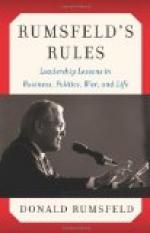If before the arrival of Sir Redvers Buller and his men the Boers could destroy a considerable fraction of the British forces now in South Africa, their chance of prolonging the struggle would be greatly improved. These forces were in two groups. There was the small army of Sir George White in Natal, something more than fifteen thousand men, and there were the detached parties holding points on the colonial railway system, Naauwport, De Aar, Orange River, Kimberley and Mafeking. These detachments, however, are largely made up of local levies, and the total number of British troops among them can hardly amount to three thousand. The whole set might be captured or otherwise swept from the board without any material improvement in the Boer position. Sir Redvers Buller is not tied to the line of railway which most of the detachments guard, and the disappearance both of the railway and of its protectors would be merely a temporary inconvenience to the British. But if during the six weeks’ respite it were possible to destroy Sir George White’s force the position would be very substantially changed. The confidence of the Boers would be so increased as to add greatly to their fighting power, the difficulties of Sir Redvers Buller would be multiplied, the probability of outside intervention might be brought nearer, and the Army of invasion to be eventually resisted would be weaker by something like a quarter. For these reasons I think Sir George White’s force the centre of gravity of the situation. If the Boers cannot defeat it their case is hopeless; if they can crush it they may have hopes of ultimate success. That was the bird’s-eye view of the whole situation a week ago, and it still holds good. The week’s news does not enable us to judge whether the Boers have grasped it. You can never be too strong at the decisive point, and a first-rate general never lets a single man go away from his main force except for a necessary object important enough to be worth the risk of a great failure. The capture of Mafeking, of Kimberley, and even of Mr. Cecil Rhodes, would not compensate the Boers for failure in Natal. Neither Colonel Baden-Powell nor Colonel Kekewich would be likely to make a serious inroad into Boer territory. I should therefore have expected the Boers merely to watch these places with parties hardly larger than patrols and to have thrown all their energy into a determined attack on Sir George White. But they seem to have sent considerable bodies, in each case several thousand men, against both Mafeking and Kimberley. This proves either that they have a superabundance of force at their disposal or that they have failed to grip the situation and to concentrate their minds, their will, and their troops upon the key of the whole position. I believe the latter to be the true interpretation.




